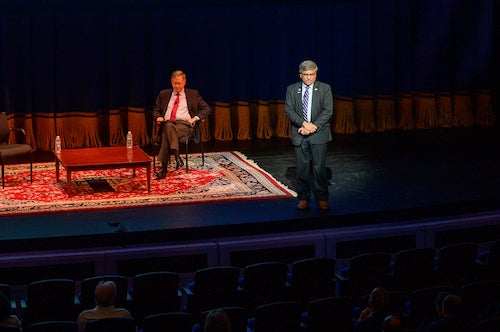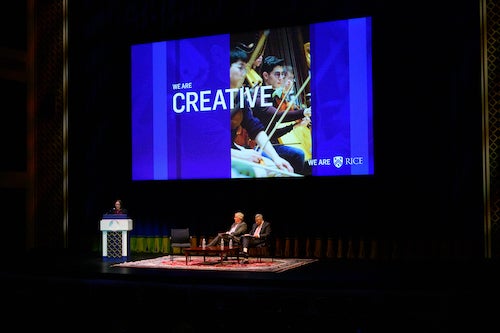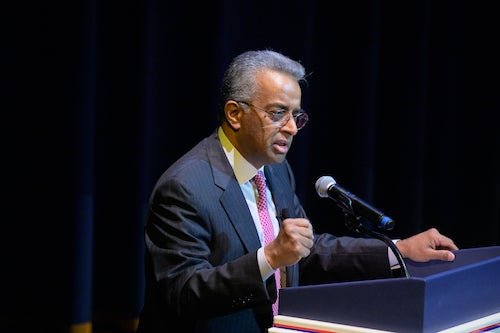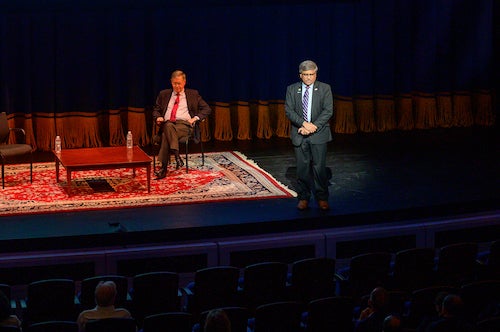The head of the National Science Foundation sees an “amazing” future for Rice University under the leadership of newly inaugurated President Reginald DesRoches.
NSF Director Sethuraman Panchanathan offered that optimistic outlook for the university during a visit to campus that included a keynote address celebrating the new president’s investiture.
“This team, I think, is going to do amazing things with energy, enthusiasm, ideas and the commitment to wanting to make sure Rice has an amazing future, building on the amazing work you’ve already done,” he said of the DesRoches administration.

Panchanathan’s energy and passion were palpable as he abandoned the podium and paced back and forth during his Oct. 21 lecture at the Morrison Theater in Rice’s Brockman Hall for Opera. His address, which was also attended by representatives from universities and colleges across the nation attending the inauguration events, spelled out his vision for the NSF and its relationship to academia.
“The time is now — we have to rewire ourselves, we have to change our thinking, we have to benefit our nation,” he said.
The NSF wants to energize and empower institutions to be successful in their research endeavors, Panchanathan said. Its mission is to promote the progress of science and to advance national health, prosperity and welfare, he said.
And, like Rice, he said the NSF is committed to ensuring accessibility and inclusivity — to providing infrastructure to more institutions to create more research powerhouses.
“If we really want to unleash the prosperity of our nation for all — and therefore we might speed up progress — we need to bring up every bit of help,” Panchanathan said. “I call them ‘the missing millions’ — the missing millions of people that have to be energized, inspired, motivated and optimized.”
Panchanathan explained that through his work with representatives and senators, he sees science is fully backed in a bipartisan manner. There may be disagreements, but there is support for advancing science, technology and engineering to keep the U.S. competitive on a global level.
“When we talk about securing global leadership, it is not a unilateral ambition and aspiration,” he said. “Leadership is not about one country a leader and others being followers. Global leadership is a shared objective of nations who share values and who share aspirations — how can we work together?”
Before the lecture, Provost Amy Dittmar and Vice President for Research Ramamoorthy Ramesh welcomed the visiting delegates. Their presentation, titled “This is Rice,” highlighted the work being done across campus and shared pre-taped speeches of representatives from the schools of Humanities, Engineering, Architecture, Social Sciences and Biosciences — and, of course, a message from DesRoches.

“What I like most about Rice is a long-standing commitment to tackling problems, not because they are easy, but because they are hard,” DesRoches said. “As a Haitian immigrant and a first-generation college graduate, I aspire to helm a community that always drives connection.”
The common thread of the speeches was an acknowledgement of Rice’s commitment to shared curiosity and solutions-focused work, and that different disciplines across campus can work together to create rich scholarship.
For instance, Caleb McDaniel, the Mary Gibbs Jones Professor of Humanities and chair of the Department of History, related his work to that of Rice scientists.
“I think that my research is similar to what my colleagues who work with a space telescope tell us about the origins of the universe,” he said in his pre-taped speech. “The more they peer back into time and the outer reaches of space, the better they understand what we are made of and how our universe works today. And the same is true in the human world — when we go to the archives, we better see how we’ve gotten to where we are.”
Ramesh spoke about the successes of Rice’s faculty and how he looks forward to continuing to create translational research — work that does not exist only in a lab or a library, but benefits those outside of Rice’s hedges as well.

“You have a tremendous research powerhouse here at Rice,” Panchanathan noted.
John Hutchinson, professor of chemistry and associate co-chair for graduate studies, and David Satterfield, director of the Baker Institute for Public Policy and former U.S. ambassador to Lebanon and Turkey, highlighted the similarities between the work of the NSF and of Rice during his introduction of Panchanathan.
“Like Rice, like the Baker Institute, (the NSF) engages in many different activities, directs policy and provides support for the evolution of, very broadly speaking, science, technology — and not just in those classic areas of so-called hard sciences, but also in areas of the arts and humanities,” said Satterfield.
Panchanathan ended his lecture with a caution that the problem of climate change will not be solved by engineering or science alone. It will take social sciences, economics, humanities and more to build comprehensive solutions to challenging problems, he said.
Panchanathan's lecture was part of the Civic Scientist Lecture Series, sponsored by the Baker Institute Science and Technology Policy Program with generous support from Benjamin and Winifer Cheng. Additional support is provided by Rice University’s George R. Brown School of Engineering and Wiess School of Natural Sciences.

